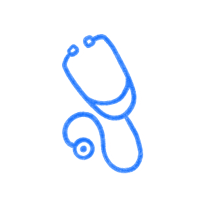The World Needs Respiratory Experts
COVID-19 has irrevocably changed our world. Specific to healthcare workers, the nature of the virus has drastically increased the need for respiratory care professionals. As many pandemic patients have had to go on ventilators and continue to have respiratory trouble long after they recover, both Certified Respiratory Therapists (CRT) and Registered Respiratory Therapists (RRT) will be in great demand.
Pocket Prep now offers exam prep for both the CRT and RRT certifications. These are the two main credentials for respiratory therapists. Both credentials are governed by the National Board for Respiratory Care (NBRC).
How Do I Get a CRT or RRT Certification?
The path to the CRT or RRT credential first goes through the Therapist Multiple-Choice exam (TMC). How well you do on the TMC exam will determine your eligibility for either the CRT or RRT. The TMC exam is designed to measure the skills, abilities, and essential knowledge that is required of respiratory therapists.
What’s the TMC exam like?
The TMC exam consists of 160 multiple-choice questions. You will be given three hours to complete the TMC Examination. The NBRC provides a content outline for the TMC exam that provides details on the different areas covered. Some of the content areas will cover topics like:
- Evaluating patient data
- Performing clinical assessments
- Gathering clinical information
- Evaluating procedure results
- Maintaining airways
- Supporting oxygenation and ventilation
Who is Eligible to Take the TMC?
The NBRC defines eligibility for the TMC as:
- Be 18 years of age or older.
and
- Be a graduate of and have a minimum of an associate degree from a respiratory therapy education program supported or accredited by the Commission on Accreditation for Respiratory Care (CoARC).
or
- Be a CRT for at least four years prior to applying for the examinations associated with the RRT credential. In addition, the applicant shall have at least 62 semester hours of college credit from a college or university accredited by its regional association or its equivalent. The 62 semester hours of college credit must include the following courses: anatomy and physiology, chemistry, microbiology, and mathematics.
or
- Be a CRT for at least two years prior to applying for the examinations associated with the RRT credential. In addition, the applicant shall have earned a minimum of an associate degree from an accredited entry-level respiratory care education program.
or
- Be a CRT for at least two years prior to applying for the examinations associated with the RRT credential. In addition, the applicant shall have earned a baccalaureate degree in an area other than respiratory care and shall have at least 62 semester hours of college credit from a college or university accredited by its regional association or equivalent. The 62 semester hours of college credit must include the following courses: anatomy and physiology, chemistry, microbiology, and mathematics.
or
- Hold the Canadian Society of Respiratory Therapists (CSRT) RRT credential.
How is the TMC Exam Scored?
As mentioned earlier, your score on the TMC exam will determine your eligibility for getting your CRT or RRT certification. The exam score is broken into two categories:
- High-cut score
- Low-cut score
If you’re in the low-cut score category, you will earn your CRT credential. If you’re in the high-cut-score category, you will earn your CRT and be eligible to take the Clinical Sims Examination (CSE). If you pass that, you’ll be awarded your RRT designation.
Why Should I Become Certified?
Both the CRT and RRT credentials can have a lasting impact on the health and well-being of both COVID-19 and non-COVID-19 patients. Getting either of these credentials puts you ahead in terms of respiratory care and knowledge. It’s also a way to advance in a more specialized area of care that isn’t going away.

